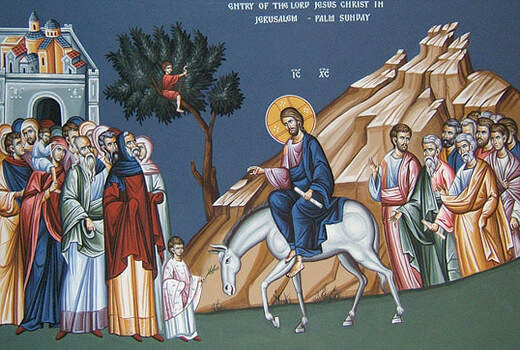|
Have you ever heard of a triumph? I do not simply mean a victory, but a Roman-style triumph. When the Romans were victorious over another nation or peoples, the army would return to Rome. In the days of the Roman Republic, a triumph was granted to a great general by the senate (in Imperial Rome, the Emperor reserved the triumph only for himself as the “savior of Rome”). During such a procession/parade, the people would gather at the Campus Martius, enter the city through the Triumphal Gate, and slowly make its way to the Capitoline Hill and to the temple of Jupiter with prayers offered to the gods. The procession could take hours or even days! The procession was led by the leaders and peoples captured by the Romans, usually in chains. Some would be in cages and mocked, others would be publicly executed. After the captured people would come the loot gained from the conquest and any exotic treasures, art or beasts captured. At this point, artistic renderings of the battles and conquests would often be processed. Then came the senators and magistrates followed by the general drawn by a four-horses chariot and wearing a laurel (bay leaves) crown (representing victory). Finally, the soldiers, dressed as civilians, unarmed, and wearing laurel crowns as well, would bring up the rear of the triumph singing ribald songs (songs of crude and vulgar nature) to the general. The procession was met by the citizens of Rome with singing and flowers being strewn in the path. A triumph was an incredible public spectacle for all the people in Rome. At first glance, this is very similar to what happened when Jesus entered Jerusalem on what we now call Palm Sunday. The procession passed through the East Gate of Jerusalem. This gate is also known as the Golden Gate, the Gate of Mercy, and biblically, as the Beautiful Gate (see Acts 3:1-2). Many people lined the route prior to Jesus’ entrance into the city and after passing through the East Gate. They were throwing palm branches and clothes at His feet, representing their mindset that Jesus was entering the city in a triumphant manner. As well, they were singing. They sang from the Psalm 118:25-26, “Hosanna! Blessed is He who comes in the name of the Lord! The King of Israel!” Jesus was not drawn by a chariot of horses (horses represented war), however. He entered the city on the foal of donkey, an animal that represents peace, and a young one at that. Finally, as Saints Matthew, Mark and Luke describe in their accounts, Jesus proceeded through the East Gate and went to the Temple.
This seems very similar to the Roman-style triumph that people would have known about. However, it is the differences that make this triumph so unique (I am sure there are many differences, but I will enumerate three). First, Jesus enters Jerusalem on an animal that represents His nature: peace. The generals entered upon an animal that represented their conquest. Jesus enters on an animal that shows His bequeathal to the world! Second, a Roman Triumph was well planned and calculated to magnify the glory of the Rome, their conquests, and of the general. The significant cost of a Roman Triumph was usually borne by the treasures looted from the vanquished. The entrance of Jesus was not planned in such a manner. Jesus decided to enter Jerusalem because He knew His time to fulfill all things had come. The disciples were surprised Jesus wanted to go there because of the threat of Jesus’ enemies (mostly consisting of the Pharisees, scribes, and Sadducees – see John 11:7-8). As Jesus approached Jerusalem, word got out to the people, and a massive throng quickly materialized. The cost of this triumph, however, was nothing. People came to see Jesus because of what He did for Lazaros and the fame He had earned for the great works He did publicly among the people. Third, a Roman triumph was replete with singing, much of it vulgar, to show the general’s prowess over his enemy. Jesus’ triumph was filled with a sacred hymn sung by all the people: “Hosanna! Blessed is He who comes in the name of the Lord! The King of Israel!” It is likely, however, that the people singing this excerpt from the Psalms really did not know why they were singing it. Many of the Israelites at that time believed that the Anointed One, the Christ, was going to come to free Israel from its worldly oppressors (Ptolemaian, Roman, whatever). Unfortunately, it was a misreading or mis-teaching of the Scriptures, particularly of the Psalms and Prophets, that led to this belief. And although they certainly were singing the correct Psalm, they may not have realized exactly why they were singing the correct Psalm. The beginning of the portion of the Psalm the crowd was singing is “Hosanna!” This means, “Save now!” Indeed, Jesus was coming to save the world by destroying sin, death, and Hades, thereby unshackling man from the bonds which kept him away from God’s eternal life (see the article on Lazaros Saturday). As for worldly freedom, that was not to happen. Jesus did not come with an army or with a political agenda. Jesus had no economy and bore no spoils of a vanquished people. Jesus came with a message! A message that God loves His people, will heal them from their sins, and will bring them into eternal life in His heavenly kingdom – and all through the death and resurrection of His Son Jesus Christ. The next line of the Psalm states, “Blessed is He who comes in the name of the Lord.” This was probably correctly understood by the people. Jesus is the “He” who is blessed because Jesus comes in the name of the Lord, God, His Heavenly Father. (As a footnote, this line is not meant to be understood in terms of anyone is blessed who comes in the name of God – it is specifically referring to the Christ, the Anointed One, Jesus.) The last part of the quotation is, “The King of Israel.” The people singing this probably did believe that Jesus was kingly, but in a worldly sense. They probably thought he was going to restore the kingship of David and Solomon and bring political freedom to the Israelites. This was not the case. Jesus came as the divine King Who will rule over a Holy Nation dedicated and consecrated to Him; separate from any political, social, or economic definitions. How do we know that the people really did not understand what they were actually singing? Look at verse 12:16. It states, “His disciples did not understand these things at first; but when Jesus was glorified, then they remembered that these things were written about Him…” If the disciples could not understand it at that very moment, it is doubtful many others would have understood in the great crowd. After all of this, the point of emphasis is that we should never expect salvation from anyone in this world. Only the love of God (John 3:16) can show us the way to true freedom, and for eternity – faith in Jesus Christ. Amen. With Love in Christ, +Fr. Nick Comments are closed.
|
AuthorsMessages written by the clergy of our parish. Archives
May 2021
Categories
All
|
© 2023
Saint Nicholas Greek Orthodox Church
3109 Scio Church Road, Ann Arbor, MI 48103
Phone: (734) 332-8200
Fax: (734) 332-8201
Saint Nicholas Greek Orthodox Church
3109 Scio Church Road, Ann Arbor, MI 48103
Phone: (734) 332-8200
Fax: (734) 332-8201


 RSS Feed
RSS Feed
